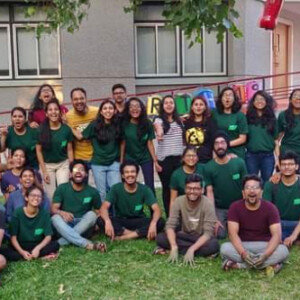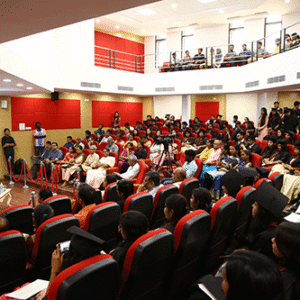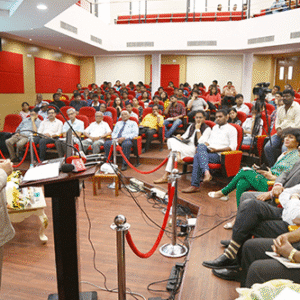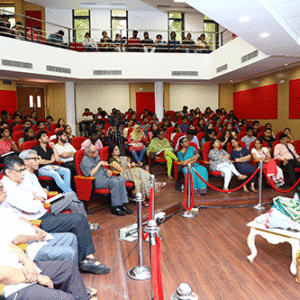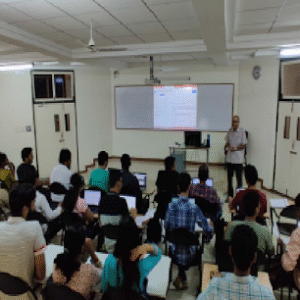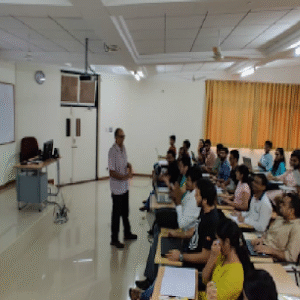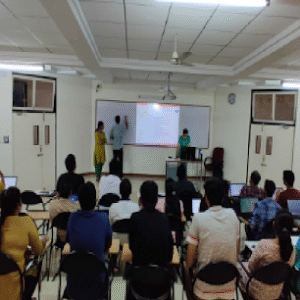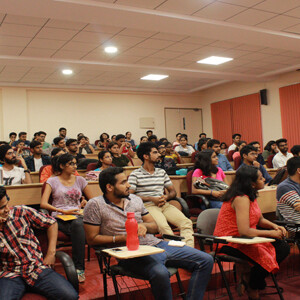The core courses lay the foundations for the basic theory and give students a feel for how it is being played out in real economies. The courses in Statistics, Optimization Techniques, Econometrics and Applied Econometrics equip them with a good range of skills and tools for quantitative analysis. The compulsory course in Fiscal and Public Policy provides a unique opportunity to understand the policy prescriptions for a developing country like India. In addition, depending on the demand, courses on subfields like Development Economics, Financial Economics, Health Economics, Games and Information, Industrial Economics, Agricultural Economics, Indian Economic Development, International Trade and so on are offered as electives

MSE offers Masters’ (M.A.) degree in Economics with the following specializations:
M.A. in General Economics
M.A. in Financial Economics
The core courses lay the foundations for the basic theory and give students a feel for how it is being played out in real economies. The courses in Statistics, Mathematical Methods, Econometrics and Applied Econometrics equip them with a good range of skills and tools for quantitative analysis. In addition, a range of onesemester elective courses to choose from are offered in the following specialized subjects- Risk Management, Investment Banking, Financial Regulation and Banking Supervision, Games and Information, Stochastic Models, Economics of Insurance, Empirical Methods in Finance.
M.A. in Applied Quantitative Finance
There has been an exponential increase in the demand for qualified financial analysts. Qualified financial analysts should have the ability to adequately capture stylized facts in financial markets through effective models, and the ability to estimate and evaluate the models. The masters program in Applied Quantitative Finance aims to develop such skilled financial analysts. The program is geared towards presenting the central concepts in clear, analytical, mathematical and computational detail with an emphasis on the underlying intuition. In addition, Business Case Studies would be provided wherever it is necessary. The elective courses include applied econometrics, stochastic models, advanced techniques in finance, financial instruments and markets, and artificial neural networks.
M.A. in Actuarial Economics
The Insurance sector in India is growing at a fast rate. Qualified Actuaries are in high demand as there is considerable shortage of trained Actuaries in India. A well-qualified actuary has to be an expert in applying mathematical, statistical and economic analysis to a wide range of decision-making processes in the fields of insurance, retirement and other benefits, and investments. The M.A. Actuarial Economics program is designed keeping in mind the courses and syllabi prescribed by the Institute of Actuaries of India. The elective courses include: appliedeconometrics, advanced techniques in finance, health economics, stochastic models, and survival models.
M.A. in Environmental Economics
Concerns about over-exploitation of resources and degradation of environment have been on rise in India and other countries over the past fifty years. High economic growth often comes at the cost of environmental degradation as seen in several countries and hence careful attention to sound environmental policies is extremely important if India were follow sustainable development path. Businesses world over have also started understanding the importance of doing ‘green’ business. The objective of the M.A. Environmental Economics is to provide students with rigorous and specialized training in economics of the environment. The elective courses include: applied econometrics, social cost benefit analysis, energy economics, trade and environment and global climate change.
With effect from AY 2021-22, MSE started offering the M.A. Programmes under its status as Institution of Special Importance, recognized by the MSE Act 2020, GoTN.
Structure of MA programme
| First year | ||
| Semester I | Four Core courses | 16 credits |
| Semester II | Five Core courses | 20 credits |
| Second year | ||
| Semester III | Two core courses + Two electives | 16 credits |
| Semester IV | Two core courses + Three electives Or Two core courses + One electives + Dissertation | 20 credits |
List of Core Courses in First and Second Year
| Semester | AE | AQF | EE | FE | GE |
| I | Microeconomics I | Microeconomics I | Microeconomics I | Microeconomics I | Microeconomics I |
| Macroeconomics I | Macroeconomics I | Macroeconomics I | Macroeconomics I | Macroeconomics I | |
| Mathematical Statistics | Mathematical Statistics | Mathematical Statistics | Mathematical Statistics | Mathematical Statistics | |
| Mathematical methods | Mathematical methods | Mathematical methods | Mathematical methods | Mathematical methods | |
| II | Microeconomics II | Microeconomics II | Microeconomics II | Microeconomics II | Microeconomics II |
| Financial Mathematics | Financial Mathematics | Introduction to Environmental Systems | Financial Mathematics | Macroeconomics II | |
| Econometric Methods | Econometric Methods | Econometric Methods | Econometric Methods | Econometric Methods | |
| Financial Economics | Financial Economics | Resource and Environmental Economics | Financial Economics | Public Economics | |
| Indian Economic Development | Indian Economic Development | Indian Economic Development | Indian Economic Development | Indian Economic Development | |
| III | Applied Micro-Econometrics | Applied Macro and Financial Econometrics | Applied Micro-Econometrics | Applied Macro and Financial Econometrics | Applied Micro-Econometrics |
| Economics of Insurance | Risk Analysis and Management | Environmental Valuation | Financial Derivatives | Development Economics | |
| IV | Advances in Life and Health Insurance | Corporate Finance | Sustainable Development | Corporate Finance | Institutional Economics |
| Finance and Financial Reporting | Stochastic Calculus & Quantitative Finance | Environmental Policy | Risk Management – Theory & Practice | Games and Information |
List of Elective Courses
| Development Economics | Stochastic Models | Public Economics |
| Games and Information | Fixed Income Securities | Advanced techniques in Finance |
| Industrial Organization | Economics of Insurance | Risk Models |
| International Trade | Investment Banking | Regional Economics |
| Indian Economic Development | Financial Regulation and Banking Supervision | Artificial Neural Networks |
| Agricultural Economics | Empirical Methods in Finance | Topics in Behavioral Finance |
| Advances in Life and Health Insurance | Financial Market Microstructure | Social Cost Benefit Analysis |
| Financial Derivatives and Corporate Finance | Trade and Environment | Energy Economics and Environment |
| Applied Microeconometrics | Applied Macro and Financial Econometrics | Economics of Global Climate Change |
| Risk Analysis and Management | Survival Models | Ecological Economics |
| Agricultural Development and Policy | Economics of Health & Environment |
Note: The list of elective courses gets periodically updated.
Till AY 2020-21, MSE offered the M.A. Programmes in collaboration with the Central University of Tamil Nadu.
Structure of MA programme
| First year | ||
| Semester I | Four Core courses | 16 credits |
| Semester II | Five Core courses | 20 credits |
| Second year | ||
| Semester III | Two core courses + Three electives | 20 credits |
| Semester IV | Two core courses + Two electives Or Two core courses + Dissertation | 16 credits |
List of Core Courses in First and Second Year
| Semester | AE | AQF | EE | FE | GE |
| I | Microeconomics I | Microeconomics I | Microeconomics I | Microeconomics I | Microeconomics I |
| Macroeconomics I | Macroeconomics I | Macroeconomics I | Macroeconomics I | Macroeconomics I | |
| Mathematical Statistics | Mathematical Statistics | Mathematical Statistics | Mathematical Statistics | Mathematical Statistics | |
| Mathematical methods | Mathematical methods | Mathematical methods | Mathematical methods | Mathematical methods | |
|
II | Actuarial Mathematics | Microeconomics II | Microeconomics II | Microeconomics II | Microeconomics II |
| Financial Mathematics | Financial Mathematics | Introduction to Environmental Systems | Financial Mathematics | Macroeconomics II | |
| Econometric Methods | Econometric Methods | Econometric Methods | Econometric Methods | Econometric Methods | |
| Financial Economics | Financial Economics | Resource and Environmental | Financial Economics | Public Economics | |
| Economics | |||||
| Indian Economic Development | Indian Economic Development | Indian Economic Development | Indian Economic Development | Indian Economic Development | |
|
III | Applied Econometrics | Applied Macro and Financial Econometrics | Applied Econometrics | Applied Macro and Financial Econometrics | Applied Econometrics |
| Economics of Insurance I | Risk Analysis and Management | Environmental Valuation | Financial Derivative and Corporate Finance | Development Economics | |
|
IV | Economics of Insurance II | Financial Institutions and Markets | Sustainable Development | International Finance | Institutional Economics |
| Finance and Financial Reporting | Interest rate Calculation and Option Pricing | Environmental Policy | Risk Management – Theory & Practice | Games and Information |
List of Elective Courses
| Development Economics | Stochastic Models | Public Economics |
| Games and Information | Fixed Income Securities | Advanced techniques in Finance |
| Industrial Organization | Economics of Insurance | Risk Models |
| International Trade Theory | Investment Banking | Programming and Computational Languages |
| Indian Economic Development | Financial Regulation and Banking Supervision | Artificial Neural Networks |
| Agricultural Economics | Empirical Methods in Finance | Topics in Behavioral Finance |
| Health Economics | Financial Market Microstructure | Social Cost Benefit Analysis |
| Financial Economics | Trade and Environment | Energy Economics and Environment |
| Environmental and Resource Economics | Health Economics | Economics of Global Climate Change |
| Multinational Enterprises and Industrial Policy | Survival Models | Ecological Economics |
| Agricultural Development and Policy | Environment and Health | Regional Economics |








